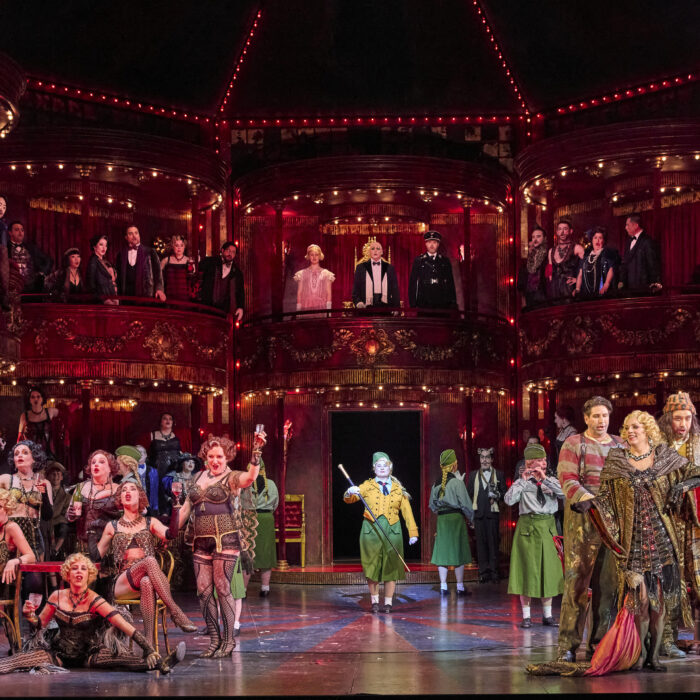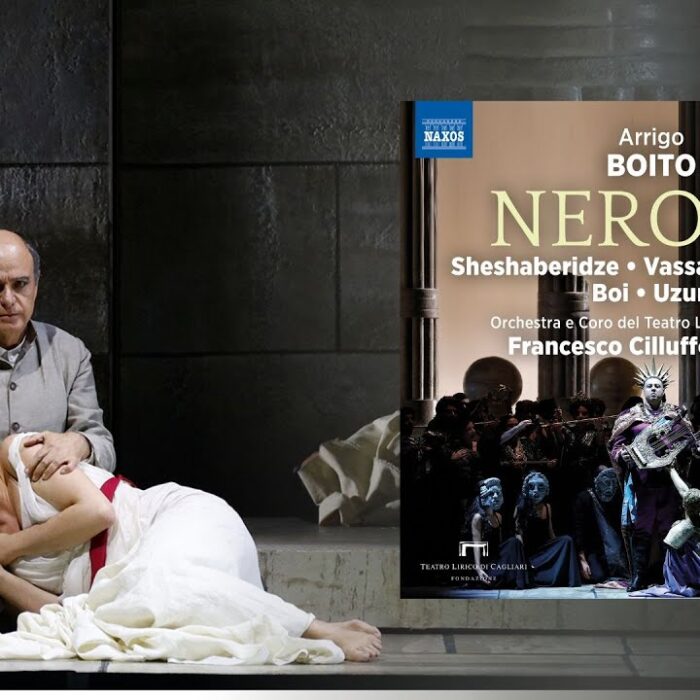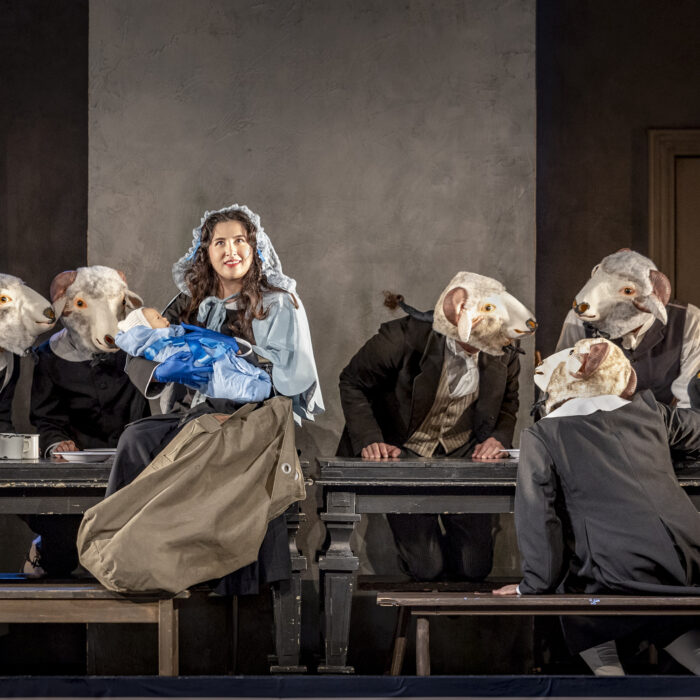
Royal Ballet & Opera 2024-25 Review: Carmen
Aigul Akhmetshina & Freddie De Tommaso Lead Stellar Cast in Remarkable Revival
By Mike Hardy(Credit: Mark Brenner)
For the second time in only a few months, I find myself reviewing a production I have seen before where I was initially very critical of what I perceived to be a weak production, creatively, but inexplicably having a change of heart the second time around. So as not to face accusations of hypocrisy or worse, senility; I feel some explanation is warranted.
First off, Damiano Michieletto’s production, first outed in April 2024, is far from perfect. It does, still, suffer the same flaws I have previously noted in my review: revolving stages that are a mere facsimile of his hugely successful “Cavalleria Rusticana” staging. Paulo Fantin’s set designs are still sparse and curiously contrived, especially the second act “Nightclub” scene which is, patently, less nightclub and more brothel.
The last outing of this production caused some obvious confusion with the inclusion of a mysterious woman who opens the opera by walking slowly across the stage, presumed to be the mother of Don José in some prophesy of doom guise. I am relieved to conclude that the confusion wasn’t just limited to myself as is evidenced in THIS outing by the mysterious woman holding up a rough effigy portrait of José, removing any doubts whatsoever as to her identity, and then for good measure, popping up in several OTHER scenes throughout the opera to reiterate her credentials, something I found to be both unnecessary and actually detrimental to the scenes.
The actors and chorus members in the crowd scenes still act with the same over-hammed gestures and elaborate histrionics, BUT…it just seemed to work this time round. Like the AI generated characters in a computer game, or deliberately engineered SIMS if you will; almost credible but yet not quite right, conducting their lives in some surreal, indefinable period where people come and go in a seemingly distant past, but dress in fairly contemporary attire and smoke strange cigarettes they light with torch-lighters. Even the cutesy, kitschy kids who come on at the commencement of each act with cardboard banners, which spell out the time narrative of the story, for example: “One Month Later” or “A few days later” etc, seemed somehow more acceptable in what is ultimately a wholly insalubrious tale with a dark ending.
Certainly, either one or a combination of revival director Dan Dooner or assistant directors Daisy Evans and Madeleine Allegra Brooks must be afforded some credit for this improved version.
However, as Aigul Akhmetshina told me a few days ago: “This is a different cast and when you have a different cast, it’s a different energy.” And this is the significant potion here which elevates this production and imbues its weaknesses with the strength of the characters and the impassioned singing.
Of course, Akhmetshina is universally accepted as the Carmen of our time, in demand for the role in opera houses throughout the world. She will, this year, have made 100 performances of it. I have seen her sing it several times, but none were as imperious as on this occasion. Her dark, enticing, husky lower register, is still as seductive as ever and her voluminous upper register as replete as before; but now there is something else: a unique, velvety, smoldering palette of colors that sets her apart from every other mezzo I have heard and this is exclusive to her. Akhmetshina’s “Habanera” was joyous, comical and assured, receiving loud applause and more than one exclaimed “Bravo!” Her “Seguidilla” was equally impressive, some of it performed laying supine on a desk. For me, however her “En vain pour éviter,” the “Card Aria” was sublime and where she was at her most impassioned.
She is also a fine actress, presenting Carmen with suitable grit, feistiness and independence, yet retaining a touching vulnerability and frailty in key moments. Were I to resort to critical pedantry, I would argue that she might refrain from some of the more outlandish, melodramatic gestures and over-dramatizing that this role compels her to act out. I believe that her natural beauty, exuberance, charisma and genuine star quality is more than enough to elevate her performance. Her performance is a genuine example of where less could be so much more. That said, her most profound moments involved great physicality; grappling with Don José to such an extent that she delivered perceptible, genuine blows to her assailant and in return, received some rough treatment and manhandling in return. Her final scenes, despite being predictable, were palpably nerve-wracking and genuinely traumatic, such was the intensity and realism she brought to them.
Aigul Akhmetshina was a nominee for the Olivier Award for Outstanding Achievement in Opera just a few days ago for this very role, relating to her performance of it in 2024. Had the judges been present on THIS occasion, there wouldn’t have been any competition.
Perhaps her performance here was enhanced by the collusion with her real-life friend and close colleague, Freddie De Tommaso as Don José. In my recent interview with Freddie, he said: “Aigul is so good. Because we know each other so well, we can push those boundaries of what you can do with each other on the stage, because what I could do with her is further than with somebody that I have a brand-new working relationship with.”
And whatever boundaries they consented to push proved hugely beneficial, because THIS love affair has real chemistry, real conviction and genuine all round credibility. De Tommaso performs with brooding intensity, at times with touching despondency and fragility, at others with real menace. His physical form and demeanor command attention and he unquestionably possesses natural stage presence. His final act anguish and despair are almost tangible.
Vocally, he is majestic in this role. Truly stentorian in the upper register, showing splendid timbre in the middle and richly dark and mellow in the lower. His duet with Micaëla in the first act was quite wonderful. When he sings “Ma mère, je la vois! Je revois mon village!” he reveals an almost tender quality to both his character and his singing. His keynote aria, “La fleur que tu m’avais jetée,” was exquisite, truly heart-rending and all the more impactive for him being isolated on stage, his Carmen having retreated to the confines of the nightclub. On the penultimate line of the aria, the ascending “et j’étais une chose à toi!,” he produced a most astonishing B flat diminuendo on the “toi” that lasted an eternity. The effort received rapturous applause at the end of the aria. In the third act, where he is being oscillated between Carmen and Micaëla, each vying for his attentions, he sings with superb resonance. He professes his adoration for and devotion to his femme fatale, and in turn his anguish and dismay at learning his mother is dying. His final act encounters with Carmen are mezmerising and vocally profound in their clarion delivery.
It has become fashionable these days for critics to refer to some tenors as being reminiscent of the “greats from a bygone age,” often without any substantive evidence. De Tommaso, without question, is redolent of a number of the great dramatic tenors of the past, and I defy anyone singing today to produce a better Don José. He is true class, without peer. This is a bold statement, no doubt, but infinitely less bold (and infinitely more factually accurate) than that made by another critic who suggested that Freddie De Tommaso should not sing the role as his voice is unsuited for it and that it could even be detrimental to it were he to attempt to sing it.
Polish bass-baritone Łukasz Goliński gets to play the alpha male toreador, Escamillo. He proves very charismatic, strutting around convincingly, vying for the affections of Carmen. His keynote aria, “Votre toast, je peux vous le rendre,” was enchanting and more than proficient, singing with lucidity. His interactions and subsequent confrontation with his rival José were totally engaging and he was most impressive in his final act scene with Carmen where she subjugates him. Devoid of much of the hammy, preening and posturing this character is frequently portrayed as possessing, he brings a tangible human facade to the role.
If anyone had any notion that this was all about the mezzo, then Chilean soprano Yaritza Véliz had other ideas. Portrayed as a rather cumbersome and frumpy Micaëla, clearly besotted by José, her duet with him was both comedic and touching. She sings with a highly polished, vibrant and melodious instrument that positively booms at times. Her third act aria in the smuggler’s hut, “Je dis, que rien ne m’épouvante,” was most moving. She sang with sweet and soft hues, and her rendition was deserving of the applause it received, particularly at curtain call where she was treated to rapturous cheers.
It was also a night of great triumph for the Jette Parker Artists, most notably for Jamie Woollard in the role of police captain Zuniga. He sings with a gorgeous, crushed velvet, treacle-rich bass that positively entrances. He also shows great maturity in his stage presence, convincing as the bullying authoritarian. I cannot recall wanting to hear a bass voice more, such is his vocal potency.
Marianna Hovanisyan and Jingwen Cai get to tease and charm as the frivolous good-time girls and Carmen besties, Frasquita and Mercédès. Hovanisyan performed with wonderfully comedic touches and clarity in her third act “Cards” rendition, and Cai’s voice is a particularly luminous, and powerful mezzo-soprano.
South African baritone Siphe Kwani cuts a larger-than-life figure as Dancaïro, a gypsy and smuggling gang member who gets down with the girls in the nightclub. He undertakes his role with conviction. He sings with a strong, confident rich voice and is clearly destined for big things.
Ryan Vaughan Davies, gang leader and all-round cool dude with dark glasses, struts his stuff as Remendado, and sings with a gleaming bright, burnished tenor voice.
The Opera House chorus, as always, were beyond magnificent, especially the girls who sang with great projection in the second act, whilst engaging in some very physical combative activity. Fight director Lockhart Ogilvie‘s involvement resulted in a number of convincing encounters and fight scenes.
Special mention must go to the children’s chorus, the Youth Opera Company, who were quite magnificent in the first and final acts, especially being vocally resplendent in the latter.
Lighting designer Alesandro Carletti created some quite splendid effects, if not a little magic considering the sparseness of the sets, employing glorious color, spots, and fills to illustrate and paint in key parts.
Maestro Mark Elder conducted with supreme confidence and subtlety, often making barely perceptible gestures and movements yet coaxing much beauty and order from the orchestra.
“Carmen” is still one of the most popular and frequently performed operas around the world. Its relevance in modern times is cemented, given its societal themes and its timeless concoction of love, obsession, control and jealousy. Its tale can never really vary; but its telling can determine its success. And on THIS showing, it is a veritable triumph for all who participated, not least for the Royal Ballet and Opera itself.



